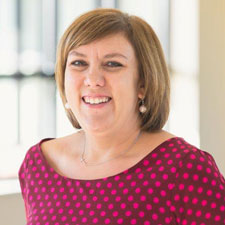 Clinical Health Coach Profile
Clinical Health Coach ProfileKelly Aho
| Julie: | Can you tell me about your background and how you became interested in health coaching in the clinical setting? |
| Kelly: | My title is Health Education Nurse and I am the Diabetes Educator at UP Health Portage in Michigan. I coordinate our diabetic self-management education program. I also work with quality. When I got involved with Clinical Health Coaching, it was because I do a lot of staff education as well as working with diabetic patients. |
| Julie: | Had you had any other coaching experience or training? |
| Kelly: | In the past I had been to training in Motivational Interviewing, but nothing formal. |
| Julie: | Have your physicians been on board with the training? |
| Kelly: | This has been a period of growth in the past year. Our hospital partnered with LifePoint. Our primary care clinics became FQHC’s (Federally Qualified Health Centers) last spring and so we had a grant that we got for one of our clinics and it was born from that. The providers have been on board, but we wish it could move faster. |
| Julie: | What has been your greatest challenge? |
| Kelly: | None of us really knew what becoming an FQHC would entail, including the people who are in the day to day operations. We are all learning together what the challenges are. We are moving in the right direction. |
| Julie: | Have your health coaching skills resulted in improvement in your diabetic patient’s self-care? |
| Kelly: | I am so used to pushing information out. It wasn’t until after taking the performance evaluation and really sitting down and practicing that it really came together. I learned to pull things out of the patient instead of pushing. That really started to make sense. I see patients at our local mental out-patient facility as well and this is where I practiced things like open-ended questions. It has made a big difference. I have an hour with patients. There is a lot to cover in that time frame. They are new to diabetes and we have a lot to go over; testing, insulin, carb counting. Trying not to overwhelm them is a challenge. |
| Julie: | Do you get to follow up with them? |
| Kelly: | Yes, I get to follow up by phone, anywhere from every day to once a week. I give them the tools and support they need. Once I consider their education complete, and once we have come to a place where they are proficient in self-care; I typically send them a survey 30 days out asking how the program is going and then I follow up after 6 months. I follow them until they feel confident and they can take it and run with it. |
| Julie: | Do you have any success stories you would like to share? |
| Kelly: | I had a type 2 diabetic patient who came in to my office, arms folded. She knew everything and just needed to do it. I thought ok, this is my perfect opportunity. My educating her was not going to work. I started with asking her, “What is the benefit of doing nothing”. That opened the floodgates and she started to talk about her life and her family and what was important to her. Allowing her to talk was important. She was a different person from the first time she walked into my education room. It’s a little more challenging with my mental health patients. |
| Julie: | What advice would you have for someone who is just beginning their journey as a health coach? |
| Kelly: | Start slow and start with one patient. I kept a list of 5 good questions with me. When I feel like I have hit a roadblock, I will pull one out. The more you use the skills the more comfortable it becomes. It is daunting at first, but it sets a rapport with your patient and lets them know you are interested in them. I use the readiness ruler all the time! |